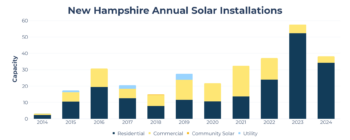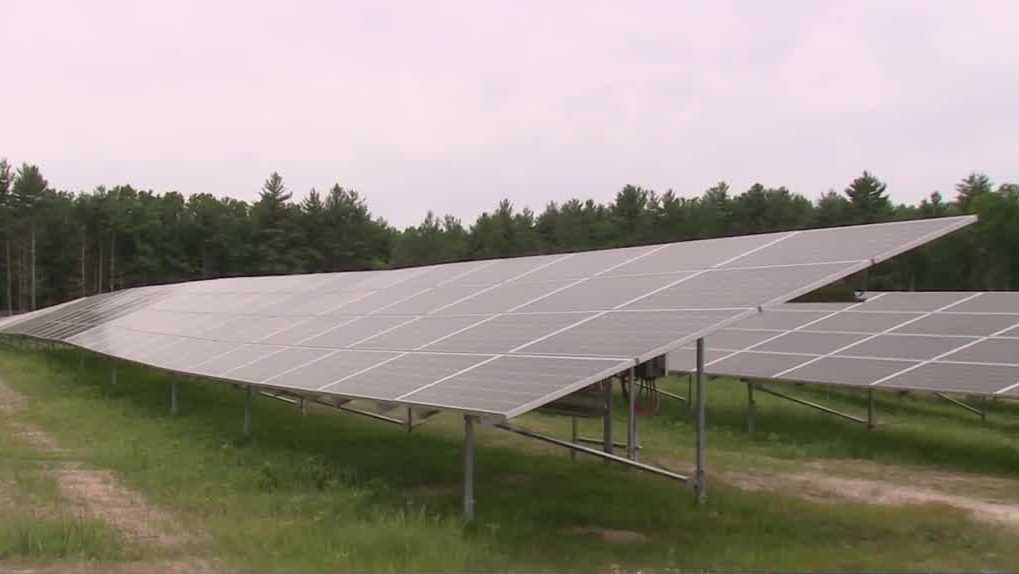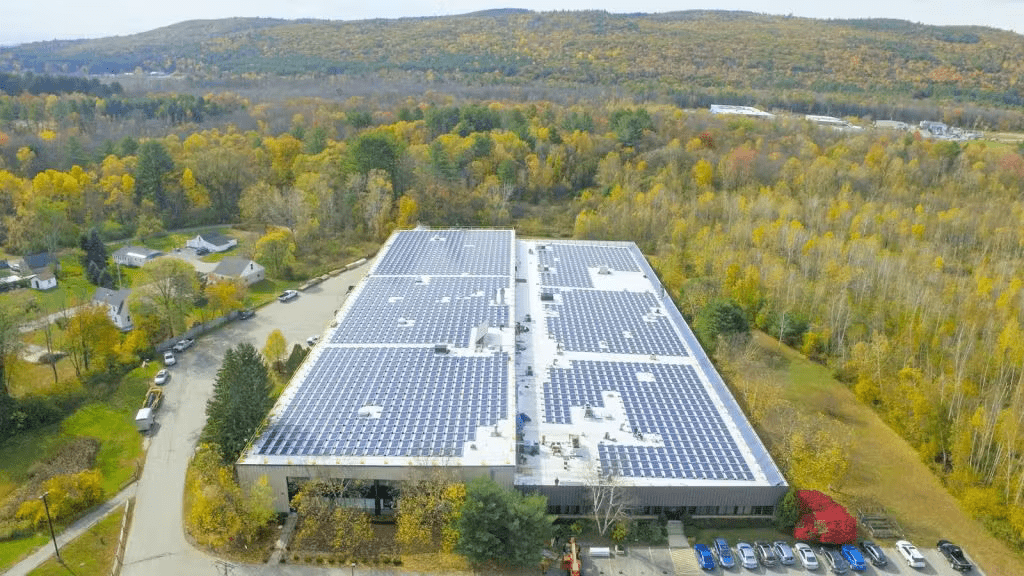State Overview
New Hampshire
National Solar Capacity Ranking: 44th
Data Current Through: Q4 2024

New Hampshire State Solar Overview
New Hampshire is home to 85 solar companies that have worked hard to make an impact in the available clean energy in the state. A large portion of these solar companies focus on manufacturing.

Just The Facts
-
Solar Installed (MW):
304
-
National Ranking:
44th (43rd in 2024)
-
Enough Solar Installed to Power:
47,451 homes
-
Percentage of State's Electricity from Solar:
2.00%
-
Solar Jobs:
1,172
-
Solar Companies in State:
52 (14 Manufacturers, 17 Installers/Developers, 21 Others)
-
Total Solar Investment in State:
$824 million
-
Prices have fallen:
42% over the last 10 years
-
Growth Projection and Ranking:
382 MW over the next 5 years (ranks 47th)
-
Number of Installations:
22,467
New Hampshire State Solar Policy Resources
-
DSIRE Incentives Database – New Hampshire – Search a public clearinghouse for specific solar energy incentives in New Hampshire and across the United States
-
New Hampshire Office of Strategic Initiatives – Renewable Energy Incentives
-
New Hampshire Public Utilities Commission – Learn about the governing body that regulates the electricity rates and services of New Hampshire’s public utilities
-
New Hampshire Solar Panels Overview – Learn about the history of solar policy in New Hampshire, along with up-to-date pricing information on EnergySage
-
New Hampshire State Legislature – Track pending legislation affecting solar energy, locate and contact individual legislators, and stay up to date on current legislative issues in New Hampshire
-
New Hampshire Sustainable Energy Association – NHSEA’s mission is to strengthen New Hampshire’s economy and conserve natural resources by promoting a transition to clean, efficient, and renewable energy.
-
Solar Panel Cost in New Hampshire – Learn about the history of solar policy in New Hampshire, along with up-to-date pricing information on EnergySage
-
Solar Rebates & Incentives in New Hampshire – Check out EnergySage’s list of key solar incentives in New Hampshire to see what programs you can benefit from
-
U.S. Energy Information Administration – New Hampshire State Profile – Explore official energy statistics, including data on electricity supply and demand, from the U.S. government
New Hampshire Energy Storage Policy and Market Overview
New Hampshire’s energy storage market is comparatively nascent to regional neighbors. However, state legislative and regulatory guidance on storage is prioritizing a cost-effective deployment with several ownership models.
New Hampshire regulators, NGOs, and utilities provide various energy storage incentives to stimulate market competition and evaluate BTM ownership models. State incentives modelled after ConnectedSolutions indicate the diffusion of energy storage policy and the success of market-based rebates. In evaluating ownership, the PUC and Liberty Utilities developed a first-of-its-kind pilot program installing five hundred home batteries to assess BTM storage efficiency and effects on customers’ bills.
Despite limited regulatory guidance on energy storage the BTM market is accelerating with tax and utility incentives. Legislative action via HB 464 (2019) allows municipalities to adopt property tax exemptions for energy storage, leaving open more opportunities for reduced system costs for homeowners and businesses.
New Hampshire Energy Storage Policy Resources
- Eversource Home Battery Storage Systems Incentive – Residential battery storage rebates modelled after ConnectedSolutions.
- Eversource Small Business Battery Storage Systems Incentive – Small business incentives for backup energy storage systems providing demand response benefits to the grid.
- Liberty Electric Residential Battery Storage Pilot Program – First-of-its-kind utility program offering time-of-use rates and customer savings for residential battery storage owners.
- New Hampshire Residential Clean Energy Fund & Loan Program –Low-cost, simple interest loans, and 100% financing options for battery storage systems. Partnered with Eversource.
- DSIRE New Hampshire Energy Storage Policy Database – Clearinghouse for financial incentives, regulations, and rebates for energy storage and lithium-ion technologies in New Hampshire and across the United States.
- Pacific Northwest National Laboratories Energy Storage Policy Database – Map of Procurement, Regulatory, Demonstration, Incentive, and Interconnection policies in New Hampshire and across the United States.
- New Hampshire Energy Storage Rebates & Incentives – EnergySage’s list of key storage incentives and rebates and see what programs you can benefit from.
- Energy Storage Cost in New Hampshire – Up-to-date storage and solar-plus-storage pricing and find installers in New Hampshire on EnergySage.
- New Hampshire Public Utilities Commission – Governing body that regulates the electricity rates and services of New Hampshire public utilities, search for regulatory dockets, programs, and initiatives.
- General Court of New Hampshire – Pending, passed, and historical legislation affecting energy storage and battery systems, locate and contact individual legislators, and stay up to date on current legislative issues in New Hampshire.



